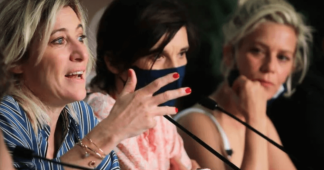By David Walsh
Various global film industry and film festival officials have stumbled over themselves in recent days to join the anti-Russian hysteria. Individuals and organizations that remained silent while entire societies were damaged or destroyed by US and NATO bombs, missiles and drone strikes have suddenly come to life and discovered “unacceptable military aggression.” Nowhere in all this, however, are there any “unequivocal” expressions of opposition to imperialist policy.
Genuine revulsion against the Putin government’s criminal invasion of Ukraine is no doubt a factor in some of the comments and actions. However, any serious examination of the ongoing events demonstrates that Washington and its allies did everything in their power to provoke the conflict and that their agenda is far-reaching and reactionary.
To view the current situation in Ukraine otherwise is to close one’s eyes to three decades of uninterrupted warfare pursued by American imperialism in the Middle East, Central Asia, North Africa and beyond, which has resulted in millions of victims. Moreover, the various anti-Russian pronouncements entirely ignore the character and trajectory of the far-right and fascist elements in and around the Ukrainian regime and military forces.
What exactly are those who express unwavering support for Ukraine, its government and its imperialist backers signing up for?
Major entertainment conglomerates, which generally operate in lockstep with the US government and the Pentagon, have announced plans to cut Russia out of their operations. The Hollywood Reporter noted March 1 that the global film and television industry had taken a “series of swift actions … in solidarity with Ukraine, with many companies beginning to sanction Russia in the wake of the invasion. Disney, Sony, Warner Bros. and Paramount have pulled or paused planned theatrical releases in the country.”
Meanwhile, “International television market MIPTV has also condemned the Russian invasion, saying that it would follow French sanctions, a move likely to mean there will be little to no Russian presence at the [annual] Cannes TV market.”
Various film festivals have taken actions against Russian films and filmmakers. The Stockholm International Film Festival announced it would “turn the spotlight on Ukraine” during its next edition to be held in November. Stockholm officials also indicated they would not screen any Russian “state-funded films” at this year’s festival, “as long as the current war is ongoing,” according to Variety. Beatrice Karlsson, Stockholm Film Festival’s head, asserted that the “decision is regrettable but a necessary mark in a time like this—Russia’s actions are unacceptable.”
Glasgow officials proceeded lamely, “This decision is not a reflection of the views and opinions of the makers of these titles. We just believe it’d be inappropriate to proceed as normal with these screenings in the current circumstances.”
The banning of Russian films, nearly all of which will have some degree of state subsidization, is a right-wing concession to the propaganda campaigns of the various European governments. Russian filmmakers, musicians and artists are not responsible for the Ukraine invasion any more than Swedish writers and directors can be held accountable for the Swedish Armed Forces’ role in the neocolonial occupation of Afghanistan, or the operations of Swedish aircraft in the 2011 NATO-led war in Libya, which has turned that country into a hell on earth, with an active slave trade among other horrors.
Nor are Scottish and English filmmakers to blame for the criminal actions of the Blair government, which enthusiastically participated in the wholesale destruction of Iraq in 2003 and subsequently.
In November 2003, the Stockholm Film Festival handed out its lifetime achievement award to US filmmaker David Lynch, who, coincidentally, has just issued a bloodcurdling statement in regard to Russia and Putin. Was Lynch (Blue Velvet, Eraserhead, Mulholland Drive and Wild at Heart) asked to dissociate himself in 2003 from the filthy policies of the Bush administration, including the detention and persecution of Muslim immigrants in the US, or face exclusion by the festival? If so, there is no record of it.
A contemporary news account of the 2003 event merely records that the “world famous director … said the inspiration for his work often came from a single small idea that grows into something larger. ‘An idea is like a seed; it carries in it inspiration. When you fall in love with an idea … it tells you exactly what to do. And all you do is translate it into a different medium,’ he said.” The deaths of tens of thousands of Iraqis and the destruction of much of its cultural life, including the looting of the Iraq Museum during the American invasion, were clearly not on Lynch’s radar screen, or the Stockholm festival’s.
The Cannes Film Festival announced this week that it would not “welcome official Russian delegations nor accept the presence of anyone linked to the Russian government” at this year’s event.
The 56th Cannes festival opened on May 14, 2003, less than two months after “the full air campaign” by the US military, termed “shock and awe,” began against Iraq. As one account explains, “The spectacular bombardment the world watched on television the first night was part of a broader attack that sent 1,000 strike sorties against military targets in Baghdad, Kirkuk, Mosul, and elsewhere.”
Another report notes, “Iraq Body Count, an organisation which tracks civilian casualties in Iraq, claims that 6,700 civilians were killed in the first three weeks of action in Iraq, during the ‘shock and awe’ phase. In the 21 days between 20 March and 9 April, when Baghdad was seized by Allied forces, 320 civilians were killed each day.” In addition, of course, thousands of virtually defenseless Iraqi soldiers were slaughtered by US forces.
Yet, in May 2003, Cannes officials offered no public criticisms of Washington’s illegal invasion, based entirely on lies, and made no objections to the US presence, official or otherwise, at their event. Two Americans served on the festival’s jury. A US film (Gus Van Sant’s Elephant) won the Palme d’Or. Mystic River, directed by Clint Eastwood, whose attitude toward militarism might at least have raised questions, competed for the top prize without incident. No one associated with the festival demanded Eastwood publicly distance himself from George W. Bush.
The Venice Film Festival has also issued similarly pious pronouncements about Russia and Ukraine. The festival will not work with any artists or professionals who have “carried out or supported” the Russian invasion; and “will not accept the presence of official delegations, institutions or persons tied in any capacity to the Russian government.”
On March 1, the European Film Academy (EFA) declared its “Unequivocal Solidarity with Ukraine.” Again, what does this entail? “Unequivocal Solidarity” with the right-wing Volodymyr Zelensky government, which is nothing more than a tool of the US and other NATO powers? With the Azov Battalion and other Ukrainian paramilitary fascists and anti-Semites?
The EFA expressed support for the boycott of Russian filmmaking urged by the Ukrainian Film Academy. “What concerns us most is the fate of the Ukrainians,” its statement went on, “and our hearts are with the Ukrainian filmmaking community. We are fully aware that several of our members are fighting with arms against the aggressor. The Academy will therefore exclude Russian films from this year’s European Film Awards and we lend our support to each element of the boycott.”
The strident EFA statement was too little and too late for Ukrainian filmmaker Sergei Loznitsa, who announced his resignation from the body on February 26. Loznitsa, a virulent anti-communist and Ukrainian nationalist, includes on his résumé the miserable film Donbass (2018). In his director’s notes for that work, as the WSWS reported, Loznitsa claimed that the fighting in Eastern Ukraine was going on “between the Ukrainian regular army, supported by volunteers, and separatist gangs, supported by Russian troops.” The absurd and grotesque situations shown in the fiction film occur, the director wrote, “because the iron logic of the underworld, which affected all those generations born and bred in the catastrophe that was the USSR, dictates its own rules.”
Loznitsa argued in 2018 that the collapse of the Soviet Union could have been followed either by the creation of “a European model,” including its emphasis on the “protection of private property,” or “the return to the totalitarian Soviet mode of existence. … Ukraine, at least the predominant part of its population, chooses the European way, whereas Russia is rapidly moving back to the USSR.”
These are the right-wing social forces and conceptions to which various film figures and organizations are offering their “solidarity” and support.
Sign up for the WSWS email newsletter
Published at www.wsws.org
We remind our readers that publication of articles on our site does not mean that we agree with what is written. Our policy is to publish anything which we consider of interest, so as to assist our readers in forming their opinions. Sometimes we even publish articles with which we totally disagree, since we believe it is important for our readers to be informed on as wide a spectrum of views as possible.












